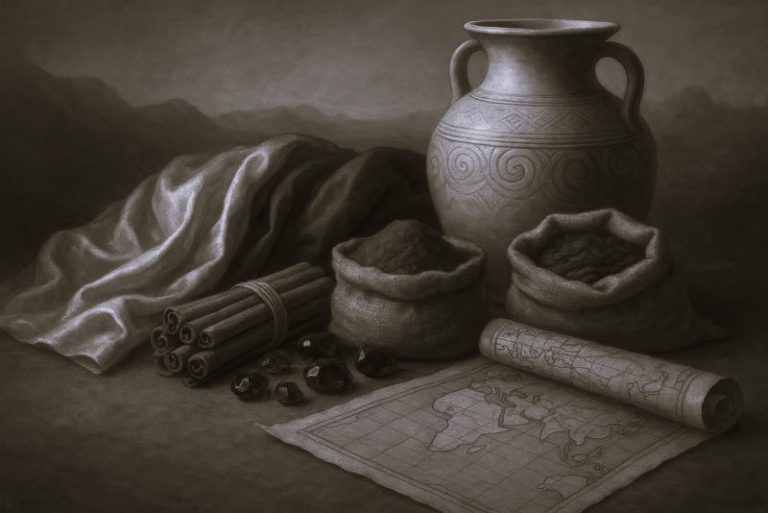
The codex didn’t catch on until surprisingly late in the ancient world.

By Benjamin Harnett
Classics Scholar
A codex is just the Roman name for a book, made of pages, and usually bound on the left. Its predecessor was the scroll or book roll, which was unrolled as you read. The codex is manifestly superior: one can hold many volumes (from the Latin for book roll, volumen); codices have a built-in cover for protection; and pages that can be numbered for reference, from which arose a cornucopia of tables of contents and indices.
The codex didn’t catch on until surprisingly late in the ancient world. The early Christians, however, took to the codex with singular enthusiasm. Wider adoption of this form seems to have corresponded to Christianity’s spread. In the 4th century, no less a figure than St Augustine illustrates the difference between a codex and a roll – and the nagging ‘Christianity’ of the codex.
Not yet baptised, in his garden where he had been reading, Augustine tells us he heard a child’s voice chant: ‘Tolle Lege!’ (‘Take up and read’). So he grabbed his book and flipped to a random page. His eyes lit upon a passage in Paul’s ‘Letters to the Romans’. The words he found were the key to his conversion. The book couldn’t have been a roll: it was a codex of the Gospels. But many of his other, often non-Christian books, were rolls.
Virtually all ancient Christian texts were codices, and with each new scrap pulled from the Egyptian sands, this has been confirmed, rare exceptions ‘proving the rule’. Historians have concluded that, while Christians probably didn’t invent the codex, their scribes had gifted the general use of it to the Roman world and, in so doing, passed it, and much of what survives of Classical literature, on to us. But an inability to explain the exact origin and nature of this ‘Christian codex’ clouds every investigation, and for good reason: this conclusion is wrong. While nearly every early Christian text is a codex, not every early codex is Christian.
Apersistent aura of opposition dogs the historical view of Christianity and Rome. For the 18th-century English historian Edward Gibbon, the introduction of inward-facing Christianity sapped the Roman Empire of vigour and social cohesion. Against him, the American sociologist of religion Rodney Stark has argued more recently that the introduction of Christianity acted as a needed ‘revitalisation’ of an enervated, dissipated culture. These are the representative strands of scholarship that recent decades of study have laboured to unwind, thus evolving our understanding of Christians in the Roman Mediterranean.
One moment shows consideration of some of the earliest Christians by Romans themselves. In the 2nd century, in his capacity as provincial governor of part of present-day Turkey, Pliny the Younger (nephew of Pliny of Natural History fame) writes to Emperor Trajan for advice in the handling of Christians, a rapidly growing sect in his territory.
In the end, he ‘discovered’ through interviewing ex-Christian members of society that Christians were gathering not to commit crimes but, in fact, took oaths to foreswear crime. He imposed a mild punishment for rejecting the imperial cult, renunciation of their God and proof, by a sacrifice, of loyalty, or death. The emperor concurred, telling Pliny not to seek out Christians to persecute, and to be wary of anonymous accusations. Gibbon thought the Romans bent over backwards to be fair.
Despite the drama, this evidence points to a kind of wary coexistence, and even integration, that the historical record bears out. We know of this exchange from the 10th volume of Pliny’s letters. The earliest manuscript of which we have evidence is a codex from about the 5th century. Six leaves of it survive at the Morgan Library in New York City. But the collection was initially circulated not as a codex but as book rolls. Pliny used book rolls, while the Christians he interacted with used the codex. The idea of the ‘Christian codex’ as against the pagan book roll remains one of the few vociferously cited axes of division.
Pliny, in his letters, never mentions any book form other than the roll, but he does mention one Marcus Valerius Martialis, aka Martial, a poet of witty epigrams of scabrous satire. Martial, who had lately died, had written some kind words about Pliny in a poem, and Pliny recalled them to a friend. Martial was also a known fan of the codex. In the second poem of his first book of epigrams, he gives directions to a bookseller where one could get a copy of his works in codex form, so comparatively portable, ‘one hand will hold me’.
In other poems, Martial describes codex editions of classics, by authors such as Homer, Virgil, Livy, Cicero and Ovid, that one could find in 1st-century Rome as Saturnalia gifts. These isolated mentions have caused scholarly contortions. It was an early experiment! Martial and the bookseller were partners in a failed entrepreneurial venture! But we have a scrap of an early Latin codex, a military history. We also have a fragment from Egypt describing a mobile bookseller who sold both rolls and codices. And in a recently discovered bit of writing, the 2nd-century Greek doctor Galen recounts the loss of his possessions in a warehouse fire at Rome, including handsome codices.
This evidence for equally early use in a mainstream fashion by some non-Christian Romans runs up against the universal early Christian embrace of the codex, and the idea of its essential ‘Christianity’ remains. It might be because the ‘book’ as we know it is tied up with our notion of intellectual progress, and so rejects practical considerations. This finds comfort in the equal centrality of the ‘book’ to the Christian religion. We identify more with the Augustine who ridiculed the Romans’ little ‘gods for everything’ than with the Augustine whose flipping-open of the Gospels is mirrored in a non-Christian (and codex-centric) trend of the same era: fortunetelling by randomly consulting the works of Virgil (Sortes Vergilianae).
Aresolution comes out of the 1940s. Bryce Ryan and Neal Gross canvassed farmers in two Iowa towns to understand how the use of a new, hybrid seed corn affected the adoption of beneficial farming technologies. Their 1943 paper was a founding document in ‘diffusion of innovations theory’. A successful adoption is characterised by an S-shaped curve growing over time. It starts slow, with innovators and early adopters, then speeds up when a critical mass is reached, slowing as the universe of potential adopters becomes dominated by laggard conservatives.
We can’t interrogate the ancient Romans, but, organised by date, the surviving scraps of books from the Mediterranean, grouped by codex and roll, describe an S-shaped curve beginning around the start of our era and, crucially, reaching critical mass solidly before Christianity does. Rome would have adopted the codex, Christians or no.
And the Christian predilection? Christians participated as early adopters. Practical characteristics drove their use. Ease of reference, capacity and portability would have recommended the codex for Christians, just as these factors recommended it to Martial.
The late T C Skeat, a papyrologist and former Keeper of Manuscripts at the British Museum in London, made experiments with wallpaper rolls to show that, with practice, reading of the book roll was not decidedly inferior to a codex. Our continued modern censure of the Romans for not adopting the codex sooner (its basic components were well known for millennia) forgets the most important resource in the Roman world: slaves. Slaves would copy, collate, retrieve, read and rewind book rolls for busy patricians (such as Pliny).
Today’s changing landscape of digital reading also presents a world dominated by negative externalities: invisible, poorly paid labourers scanning old books (viz, the occasional disembodied hand in latex glove flashed across a Google Books page); environmental and health challenges of mining rare earths and working long shifts to assemble our electronic devices; and the fossil fuels burned into the atmosphere to flash bytes of literature into storage arrays and send them on their way.
We cannot, after all, look back on the change from roll to codex to provide a spiritual gloss to this change, but find one wrought by the same accumulation of practical individual decisions; difficult to predict, but imperative in result.
Originally published by Aeon, 04.15.2019, under a Creative Commons Attribution-No Derivatives license.







